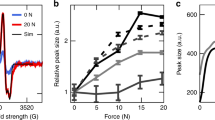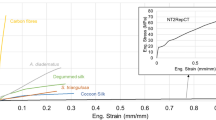Abstract
FURTHER evidence that the strained disulphide bonds of stretched animal fibres are more reactive than unstrained bonds has been obtained in experiments with mercuric chloride. Purified human hair fibres of measured cross-sectioned area were immersed in a solution of mercuric chloride (0.1 M) in hydrochloric acid (0.1 N) for 24 h at 22.2° C and then stretched different amounts in the same medium. After being released, the fibres were washed for 7 days in running water before their load/extension curves were determined up to the breaking point in distilled water at 22.2° C. Values for the work required for 55 per cent extension were derived from the load/extension curves and give the lower curve in Fig. 1.
This is a preview of subscription content, access via your institution
Access options
Similar content being viewed by others
References
Speakman, J. B., J. Text. Inst., 27, P, 236 (1936). Challenger, F., and Rawlings, A. A., J. Chem. Soc., 868 (1937).
Hoare, J. L., Ripa, O., and Speakman, J. B., Nature, 196, 268 (1962).
Author information
Authors and Affiliations
Rights and permissions
About this article
Cite this article
HOARE, J., SPEAKMAN, J. Action of Mercuric Chloride on Strained Keratin. Nature 199, 1091–1092 (1963). https://doi.org/10.1038/1991091a0
Issue Date:
DOI: https://doi.org/10.1038/1991091a0
This article is cited by
-
Reactivity of Disulphide Bonds in Strained Keratin
Nature (1965)
Comments
By submitting a comment you agree to abide by our Terms and Community Guidelines. If you find something abusive or that does not comply with our terms or guidelines please flag it as inappropriate.



